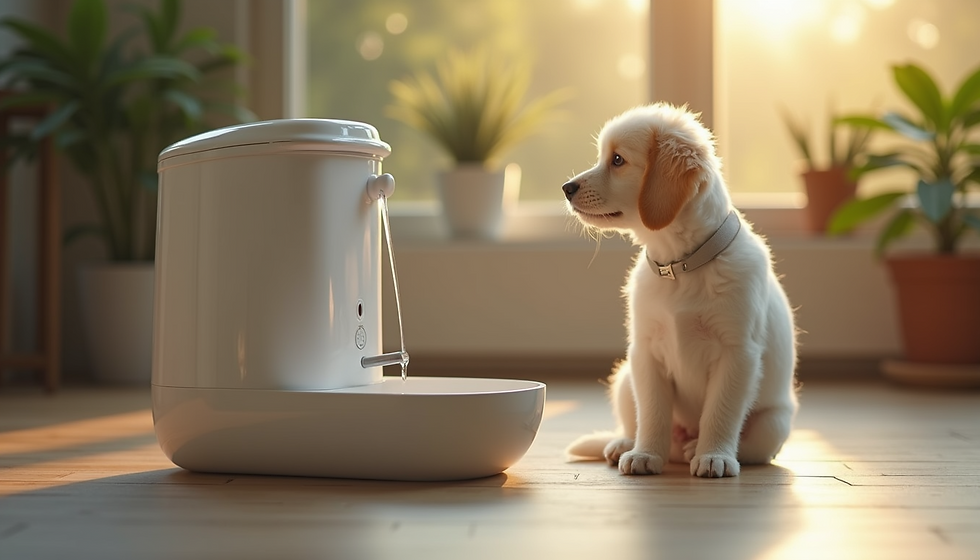Decoding the Delicious: Your Guide to the Best Cat Food for a Healthy Feline Friend
- LAs Haven null
- May 8
- 5 min read
Updated: 6 days ago
Hey fellow cat lovers! We all want the best for our furry companions, right? From endless cuddles to playful pounces, our cats bring so much joy into our lives. And just like us, their health and happiness start from within – with the food they eat.
Navigating the world of cat food can feel like deciphering a secret code. With countless brands, ingredients, and dietary options, how do you choose what’s truly the best cat food for your beloved feline? Don't worry, we're here to paw-sitively guide you through the essentials of a healthy feline diet and help you make informed choices for nutritious pet meals.
The Nutritional Paw-erhouse: Key Ingredients for a Thriving Kitty
Cats are obligate carnivores, meaning their bodies are specifically designed to thrive on a meat-based diet. Understanding the crucial nutrients they need is the first step in selecting the right food.
Protein: The Building Blocks of Life: Just like their wild ancestors, domestic cats need high levels of animal protein for strong muscles, healthy tissues, and a robust immune system. Look for real meat sources like chicken, fish, or beef listed as the primary ingredients.
Taurine: The Essential Amino Acid: This is a big one! Taurine is an amino acid that cats cannot produce on their own in sufficient amounts. It's absolutely vital for healthy vision, heart function, digestion, and reproduction. A deficiency can lead to serious health issues, so ensure your cat's food explicitly lists taurine.
Healthy Fats & Omega-3s: Shine Inside and Out: Fats provide energy and help absorb essential vitamins. Omega-3 fatty acids, often found in fish oil, are particularly beneficial for a shiny coat, healthy skin, and can even support brain function and reduce inflammation.
A Menu Tailored to Your Cat: Breed, Age, and Health Matter
Just like us, every cat is unique! Their nutritional needs can vary based on several factors:
Age: Kittens have different dietary requirements than adult cats, needing more calories and nutrients for growth. Senior cats might benefit from easily digestible formulas with added joint support.
Activity Level: A highly active outdoor cat will burn more calories than a relaxed indoor companion. Choose a food that provides the appropriate energy levels.
Breed: While all cats are obligate carnivores, some breeds may have predispositions to certain health conditions that can be managed through diet. For example, some breeds might be more prone to urinary issues.
Health Needs: Cats with specific health concerns like kidney disease, urinary problems, or allergies require specialized diets formulated to manage these conditions.
Decoding the Food Bowl: Dry, Wet, or Raw?
Now, let's talk about the different types of cat food available:
Dry Kibble: Convenient and often more cost-effective, dry food can help with dental health in some cats due to its abrasive texture. However, it generally contains lower moisture content, which might not be ideal for all cats, especially those prone to urinary issues.
Wet Food: With a higher moisture content, wet food can help keep your cat hydrated and is often more palatable for picky eaters. It also tends to be higher in protein compared to some dry foods.
Raw Food: Mimicking a cat's natural prey diet, raw food consists of uncooked meat, bones, and organs. While some owners swear by its benefits, it requires careful preparation and sourcing to ensure nutritional balance and prevent foodborne illnesses. Always consult with a veterinarian before switching to a raw diet.
Spotlight on Some Contenders:
Let's take a closer look at some readily available options:
Goodest Cat Tender Tuna Wet Cat Food Pouch: This wet food pouch offers a tasty and hydrating option with tuna as a primary protein source. Wet food is generally a good way to increase your cat's water intake, which is crucial for kidney health.
Royal Canin Urinary Care Adult Dry Cat Food: Specifically formulated for adult cats prone to urinary issues, this dry food aims to support a healthy urinary tract. It highlights the importance of tailored nutrition for specific health needs.
Whiskas Adult Wet Cat Food Pouch: A widely available and often budget-friendly wet food option. While convenient, always check the ingredient list to ensure it provides adequate levels of high-quality protein and essential nutrients.
Petsup Cat Treats Fish Oil Hairball Premium Licky Urinary Care Soft Cat Wet Food Cats Kitten Treats: This product highlights the benefits of fish oil (Omega-3s) for coat health and hairball management, while also suggesting urinary care benefits. Treats can be a good supplement but shouldn't replace a balanced main diet.
WHISKAS Cat Dry Food - Ocean Fish Flavor: WHISKAS Cat Dry Food in Ocean Fish Flavor is specially formulated to provide your cat with a balanced diet rich in essential nutrients. This delicious dry food is made with real ocean fish, ensuring a taste that cats love. The crunchy texture promotes dental health by reducing plaque and tartar buildup, while the added vitamins and minerals support overall well-being. Give your feline friend the nutrition they deserve with WHISKAS!
Petsup Freeze Dried Cat Food - Adult & Kitten Salmon Tuna: Petsup Freeze Dried Cat Food in Salmon and Tuna flavor is a premium option for both adult cats and kittens. This freeze-dried formula preserves the natural flavors and nutrients of the ingredients, making it a highly palatable and nutritious meal. Rich in protein and omega fatty acids, it supports healthy growth and development in kittens and maintains optimal health in adult cats. Easy to prepare and store, this food offers convenience without compromising on quality.
Tips for Choosing the Purr-fect Plate:
Read the Ingredient List: The first few ingredients make up the bulk of the food. Look for named meat sources (chicken, turkey, salmon) rather than vague terms like "meat by-products."
Check the Nutritional Adequacy Statement: Look for a statement from AAFCO (Association of American Feed Control Officials) that confirms the food provides complete and balanced nutrition for your cat's life stage.
Consider Your Cat's Individual Needs: Age, activity level, breed predispositions, and any existing health conditions should all factor into your decision.
Transition Slowly: If you're switching your cat's food, do it gradually over 7-10 days to avoid digestive upset.
Consult Your Veterinarian: Your vet is the best resource for personalized dietary recommendations based on your cat's specific health needs.
The Final Paw-sitive Step:
Choosing the right cat food is an act of love that directly impacts your feline friend's health and happiness. By understanding their nutritional needs and considering their individual requirements, you can make informed decisions that will keep them purring for years to come.
Ready to upgrade your cat's mealtime? We encourage you to explore high-quality cat food options that prioritize real meat, essential nutrients, and cater to your cat's unique needs. Your furry companion will thank you for it!










留言